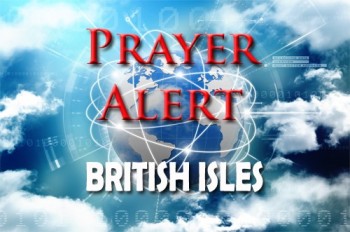Israel: tensions in Tel Aviv
Many participating groups in 2019’s Eurovision Song Contest are already in Tel Aviv, with more arriving daily. The finale will be on 18 May, in the same week as Palestinians commemorate Nakba. This was 71 years ago, when 700,000 people left their homes at the time when Israel was born. Activists say the venue for the competition was built on land of a former Arab village which emptied in 1948. As anxiety mounts, the foreign ministry spokesman, Emmanuel Nahshon, said, ‘This is going to be a huge party with thousands of people participating, but we will remain extremely vigilant in order to make sure that no-one comes here to disturb and destroy,’ The event, watched by a global TV audience, will also become a focus for protests against the country’s treatment of Palestinians. Prime minister Benjamin Netanyahu wanted to hold Eurovision in Jerusalem, to add weight to Israel’s campaign for global recognition of the holy city as Israel’s capital.
India: pastor acquitted - violence increases
Blind pastor Balu Saste's case took three years to be settled in court; his acquittal is being hailed as a triumph by Christian persecution watch groups. The pastor, his wife, and eleven church members were violently attacked by a mob during church services. Police arrested him, his wife, and their six-year-old son, stripped them, beat them, detained them without bail for three days, and falsely charged them with forcing Christian conversions. The story is not unique. Violence against Christians has risen significantly. In three months the United Christian Forum and ADF India have documented over 80 violent mob attacks against Christians in 13 different states across India. The attacks often take a similar shape, and rarely receive police attention. Christians face injustice continually, and the ruling in Balu’s case shows that the fundamental rights of religious minorities can and should be protected in the courtroom and through effective legal advocacy.
Bolivia: defending children from sexual violence
Bolivia is a country of breathtaking landscapes, rich traditions, the home of many indigenous people groups, and the largest salt flats in the world. But in the midst of its beauty and diversity, a horrific plague threatens the safety of many children: sexual violence. Getting justice in court takes years; the process is complex, cumbersome and frequently derailed. Sexual predators act with impunity. Young survivors who live in poverty have little hope of finding justice. Courts are backlogged and often lack effective case-management processes. The few cases that move through the system can take years before reaching a sentence. International Justice Mission (IJM) are fighting to change this system and protect children from sexual violence. Last week news came of IJM representing school children and securing eight convictions. Two of the perpetrators were teachers in rural communities, so the families faced strong resistance from the community.
South Africa: Christians march for true freedom
Worship songs and heartfelt prayers filled the streets of neighbourhoods across South Africa on Freedom Day, Saturday 4 May, as believers celebrated their freedom in Christ and prayed for change in the country. Over 80 Jesus Marches took place in small towns and in big cities. Many participants were armed with black bags to clean the streets while praying. At the 10am start of the marches a prayer for the nation that was streamed to all the march venues via mobile phones. The central theme was John 8:36 - ‘Who the Son sets free is free indeed’. Many referred to the event as celebrating ‘True Freedom Day’, as only Christ can truly set us free and no government or worldly system can provide all the answers to society’s problems. Christians were encouraged to wear white on election day - Wednesday 8 May. See also the next article, on the elections.
South Africa: pivotal elections
Twenty-five years ago, under Nelson Mandela, the African National Congress (ANC) party ended apartheid, but since then it has governed poorly. Four in ten South Africans still live in poverty. Half of young people are unemployed, in an unequal society caused by corruption at all government levels. Seven out of ten South Africans don't trust politicians and many under-30s did not bother to vote in the 8 May elections. At the time of writing, ballot results are trickling in with the results expected on 11 May. The weakness of its challengers means that the ANC is expected to win again, but national projections show a drop in support of 8%. Recently the ANC replaced President Zuma with his deputy, Cyril Ramaphosa, who is attempting to recover stolen state funds. So far he has been unable to remove the deeply entrenched crony networks of corrupt local officials and power brokers who deliver many votes for ANC. See also the previous article, and
Global: teen suicides
A US study found that teenage suicide rates increased after the release of a Netflix drama called ‘13 Reasons Why' - a story of a high-school girl who kills herself. Researchers estimated an additional 195 suicide deaths among 10- to 17-year-olds in the nine months after its release, an increase of 29%. The additional deaths mainly affected boys. In New Zealand recently hundreds marched to Parliament for teen suicide awareness because the government has not done enough to stem the trend. The marchers pushed through barriers set up at Parliament to place photos of their loved ones at the top of the steps. They then sang a waiata (a traditional Māori song) as hundreds more watched and filmed. In England, Rachael Warburton said her 12-year-old daughter, Jessica, left a suicide note with six reasons to kill herself after watching a Netflix show. See: and
Sudan: ‘deep state’ of Islamists remains
Omar al-Bashir is no longer Sudan’s president, but those who served him want to hold on to power through a military council. Meanwhile, protesters are still staging a sit-in outside Khartoum’s military headquarters and demanding that power be handed over to civilians. Islamist regime insiders who were close to al-Bashir remain in the shadows, and, unfortunately for the Christian minority of 3%, they are determined to maintain their grip on power. These Islamists are what is being described in media reports as a ‘deep state’ of shadowy authority figures that could eventually seize power in a counter-coup. Islamist influence is strong in the upper echelons of the armed forces and political parties are weakened by decades of authoritarian rule. It will be difficult for independent individuals with experience and strength to deal with these dangers.
Israel: secular Jews discover the Living God
A Jewish refugee couple from Russia were not interested in hearing about Christ, but they did participate in a marriage seminar based in Israel. L and Y had benefited from previous marriage guidance, but still felt a residue of bitterness beneath the surface. The teaching made big differences in their married life, but it was coming to faith in Christ that made all things new. ‘It has made me see that, despite the past, I can start building a better present. I have drawn so much nearer to God, I realised that in prayer I can ask for wisdom and understanding in different situations I might be in.’ Jewish refugees from former Soviet bloc countries as well as Israeli nationals come to faith in Christ through the native ministry’s varied outreaches - feeding the hungry, biblical tours of the Holy Land, celebration of Jewish festivals like Passover, and evangelistic courses and events.
Syria: fighting IS, finding Jesus
When Kobani was under siege by IS most of the city was destroyed and thousands fled. But IS’s violence caused a re-examination of Islam by the Kurds. When Christian Kurds are asked, ‘What made you change?’ they reply, ‘What IS did opened our eyes.’ When they saw first-hand the death and destruction wrought by radical Islam, they revised their beliefs, saying, ‘Islam in theory is different to Islam in action’. Brother Rachid said, ‘When we read “Kill the infidels” it’s only a sentence, but when you see the blood - it changes your attitude. The Lord has used these circumstances to bring people to faith. It is still growing like this (pointing upward), accelerating, huge numbers.’ About twenty families (80 to 100 people) now worship at Kobani’s new church. ‘We meet on Tuesdays and hold a service on Fridays. It is open to anyone who wants to join’, he said.
Turning women’s lives around
Women who have had a brush with the law are turning their lives around by making luxury handmade chocolates at a community interest company called Positive Changes. People with criminal records face barriers to employment - no qualifications, low self-esteem. Grace Chocolates, based in a church hall, is breaking their cycle of re-offending by giving them a job. In twelve months, six volunteers working with women one day a week made 19,000 chocolate truffles. Mary, an ex-drug user, said, ‘I was put on a court order and got involved with Positive Changes. It’s more than just a chocolate-making company. Words cannot easily describe how my life has been turned round 360o. When I started the course I was quiet and withdrawn. But my self-esteem and self-confidence is now sky-high by comparison. Rev Dan Harper said, ‘Positive Changes is freeing ladies to grow into the people that God made: wonderful, worthwhile people capable of love, compassion and hope.’










